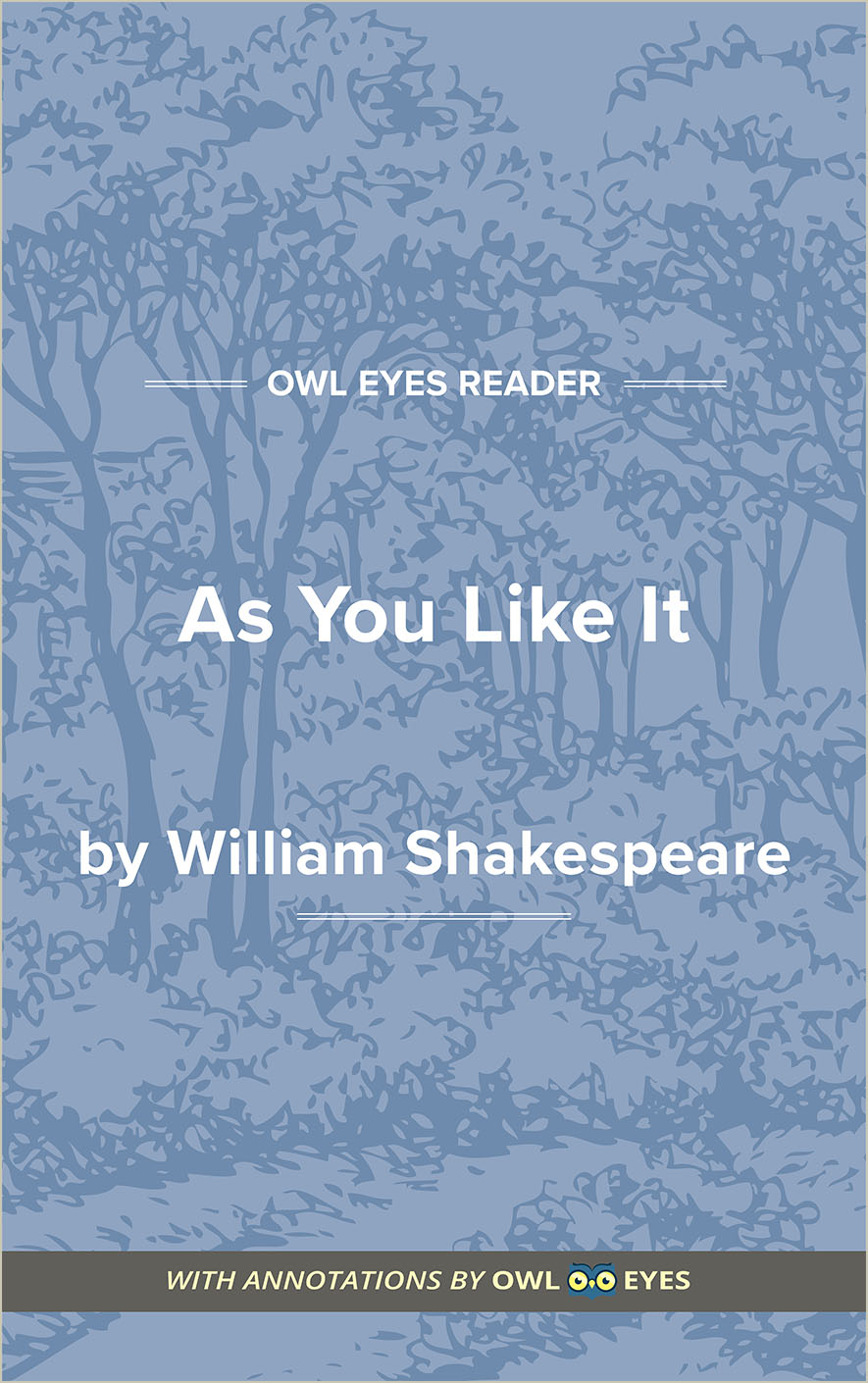Analysis Pages
Themes in As You Like It
Themes Examples in As You Like It:
Act I - Act I, Scene 1
🔒"for my soul, yet I know not why, hates nothing more than he...." See in text (Act I - Act I, Scene 1)
"you have trained me like a peasant, obscuring and hiding from me all gentleman-like qualities:..." See in text (Act I - Act I, Scene 1)
"villain..." See in text (Act I - Act I, Scene 1)
"they say many young gentlemen flock to him..." See in text (Act I - Act I, Scene 1)
" mutiny against this servitude;..." See in text (Act I - Act I, Scene 1)
"old Robin Hood of England..." See in text (Act I - Act I, Scene 1)
"his countenance seems to take from me: he lets me feed with his hinds, bars me the place of a brother, and as much as in him lies, mines my gentility with my education...." See in text (Act I - Act I, Scene 1)
Act I - Act I, Scene 2
🔒"if you saw yourself with your eyes, or knew yourself with your judgment, the fear of your adventure would counsel you to a more equal enterprise. We pray you, for your own sake, to embrace your own safety and give over this attempt...." See in text (Act I - Act I, Scene 2)
"No; when Nature hath made a fair creature, may she not by Fortune fall into the fire?..." See in text (Act I - Act I, Scene 2)
Act I - Act I, Scene 3
🔒"No; let my father seek another heir...." See in text (Act I - Act I, Scene 3)
"Thou art thy father's daughter; there's enough...." See in text (Act I - Act I, Scene 3)
"Yet your mistrust cannot make me a traitor: Tell me whereon the likelihood depends...." See in text (Act I - Act I, Scene 3)
" outface it with their semblances...." See in text (Act I - Act I, Scene 3)
"A gallant curtle-axe upon my thigh, A boar spear in my hand;..." See in text (Act I - Act I, Scene 3)
"Doth it therefore ensue that you should love his son dearly? By this kind of chase I should hate him, for my father hated his father dearly; yet I hate not Orlando...." See in text (Act I - Act I, Scene 3)
Act II - Act II, Scene 1
🔒"Here feel we not the penalty of Adam,--..." See in text (Act II - Act II, Scene 1)
"Did he not moralize this spectacle? FIRST LORD. O, yes, into a thousand similes...." See in text (Act II - Act II, Scene 1)
Act II - Act II, Scene 3
🔒"I will not call him son-..." See in text (Act II - Act II, Scene 3)
Act II - Act II, Scene 4
🔒"CORIN. Who calls? TOUCHSTONE. Your betters, sir. CORIN. Else are they very wretched...." See in text (Act II - Act II, Scene 4)
"weaker vessel..." See in text (Act II - Act II, Scene 4)
Act II - Act II, Scene 7
🔒"I am the duke That lov'd your father...." See in text (Act II - Act II, Scene 7)
"I thought that all things had been savage here; And therefore put I on the countenance Of stern commandment...." See in text (Act II - Act II, Scene 7)
Act III - Act III, Scene 1
🔒"Thy lands, and all things that thou dost call thine Worth seizure, do we seize into our hands,..." See in text (Act III - Act III, Scene 1)
Act III - Act III, Scene 2
🔒"Why, if thou never wast at court, thou never saw'st good manners; if thou never saw'st good manners, then thy manners must be wicked; and wickedness is sin, and sin is damnation...." See in text (Act III - Act III, Scene 2)
Act IV - Act IV, Scene 1
🔒"Nay, you might keep that check for it, till you met your wife's wit going to your neighbour's bed...." See in text (Act IV - Act IV, Scene 1)
"Then you must say..." See in text (Act IV - Act IV, Scene 1)
Act V - Act V, Scene 2
🔒"Neither call the giddiness of it in question, the poverty of her, the small acquaintance, my sudden wooing, nor her sudden consenting; but say with me, I love Aliena;..." See in text (Act V - Act V, Scene 2)
Act V - Act V, Scene 4
🔒"good beards, or good faces, or sweet breaths..." See in text (Act V - Act V, Scene 4)
"If I were a woman,..." See in text (Act V - Act V, Scene 4)
"I am not furnished like a beggar; ..." See in text (Act V - Act V, Scene 4)

